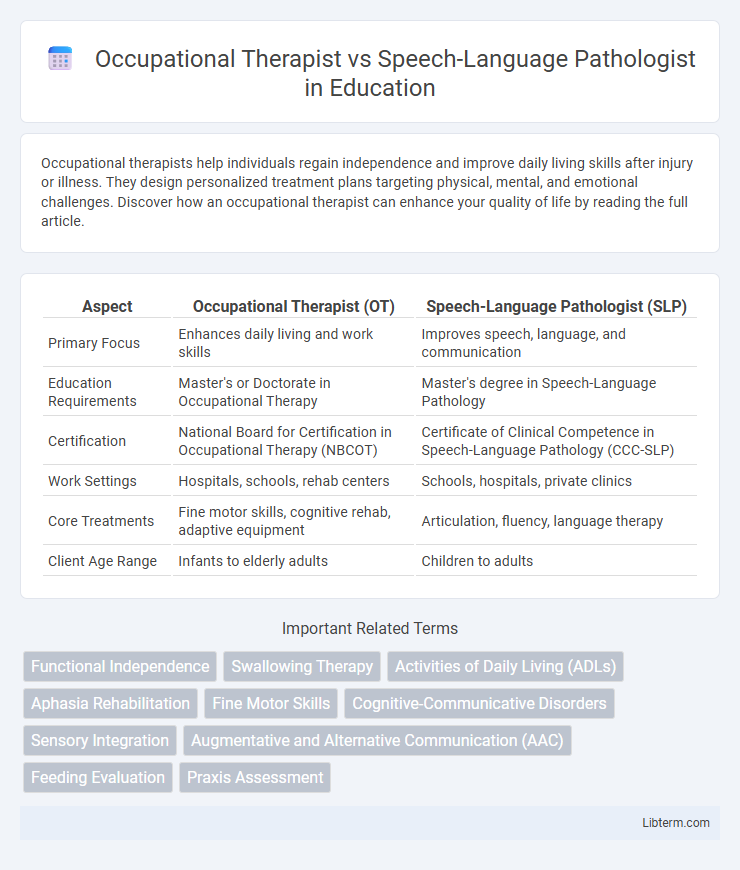Occupational therapists help individuals regain independence and improve daily living skills after injury or illness. They design personalized treatment plans targeting physical, mental, and emotional challenges. Discover how an occupational therapist can enhance your quality of life by reading the full article.
Table of Comparison
| Aspect | Occupational Therapist (OT) | Speech-Language Pathologist (SLP) |
|---|---|---|
| Primary Focus | Enhances daily living and work skills | Improves speech, language, and communication |
| Education Requirements | Master's or Doctorate in Occupational Therapy | Master's degree in Speech-Language Pathology |
| Certification | National Board for Certification in Occupational Therapy (NBCOT) | Certificate of Clinical Competence in Speech-Language Pathology (CCC-SLP) |
| Work Settings | Hospitals, schools, rehab centers | Schools, hospitals, private clinics |
| Core Treatments | Fine motor skills, cognitive rehab, adaptive equipment | Articulation, fluency, language therapy |
| Client Age Range | Infants to elderly adults | Children to adults |
Overview: Occupational Therapist vs Speech-Language Pathologist
Occupational therapists specialize in enhancing patients' daily living and fine motor skills through therapeutic activities, while speech-language pathologists focus on diagnosing and treating communication disorders, including speech, language, and swallowing difficulties. Both professions require graduate-level education and clinical certification but differ in their therapeutic goals and patient outcomes. Collaboration between occupational therapists and speech-language pathologists often improves comprehensive rehabilitation for individuals with neurological or developmental conditions.
Educational Requirements and Certifications
Occupational Therapists (OTs) typically require a Master's or Doctoral degree in occupational therapy from an accredited program, followed by passing the National Board for Certification in Occupational Therapy (NBCOT) exam to become licensed. Speech-Language Pathologists (SLPs) must earn a Master's degree in speech-language pathology, complete a clinical fellowship, and obtain certification from the American Speech-Language-Hearing Association (ASHA) along with state licensure. Both professions emphasize rigorous graduate education, clinical training, and certification to ensure standardized competency and professional practice.
Key Roles and Responsibilities
Occupational therapists focus on enhancing patients' daily living and motor skills through therapeutic activities designed to improve physical and cognitive functions. Speech-language pathologists specialize in diagnosing and treating communication disorders, swallowing difficulties, and speech impairments across all age groups. Both professions require collaboration with healthcare teams to develop individualized treatment plans that promote patient independence and quality of life.
Patient Populations Served
Occupational Therapists primarily serve patients with physical, developmental, or cognitive impairments affecting daily living skills, including those recovering from injuries, stroke, or managing chronic conditions. Speech-Language Pathologists focus on individuals with communication disorders, speech delays, swallowing difficulties, and language impairments, often working with children, stroke survivors, and patients with neurological conditions. Both professionals collaborate in interdisciplinary care settings but address distinct functional needs aligned with their specialties.
Common Treatment Approaches
Occupational therapists and speech-language pathologists both use client-centered, evidence-based interventions tailored to individual needs; occupational therapists focus on improving daily living skills, motor functions, and cognitive abilities through activities such as adaptive equipment training and fine motor exercises. Speech-language pathologists target communication disorders and swallowing difficulties using techniques including articulation therapy, language intervention activities, and augmentative and alternative communication systems. Both professionals collaborate to enhance patients' functional independence and quality of life across various settings.
Work Environments and Settings
Occupational therapists primarily work in hospitals, rehabilitation centers, schools, and nursing homes, focusing on helping patients develop or recover daily living and work skills. Speech-language pathologists are commonly employed in schools, healthcare facilities, and private practices, specializing in diagnosing and treating communication and swallowing disorders. Both professions frequently collaborate in multidisciplinary teams within medical and educational environments to provide comprehensive patient care.
Differences in Assessment Methods
Occupational therapists assess clients by evaluating fine motor skills, sensory processing, and daily living activities to identify physical and cognitive barriers to independence. Speech-language pathologists conduct comprehensive evaluations of speech, language, communication, and swallowing functions using standardized tests and observational techniques. These distinct assessment methods reflect the unique focus of occupational therapy on functional performance and speech-language pathology on communication and swallowing disorders.
Collaboration and Interdisciplinary Care
Occupational therapists and speech-language pathologists collaborate closely to provide comprehensive care that addresses both functional and communicative challenges in patients. This interdisciplinary approach combines expertise in motor skills, daily living activities, and speech or language therapy to develop personalized treatment plans. Their teamwork enhances patient outcomes by targeting overlapping areas such as cognitive-communication deficits and fine motor coordination simultaneously.
Career Growth and Salary Comparison
Occupational Therapists (OTs) and Speech-Language Pathologists (SLPs) both experience strong career growth, with the U.S. Bureau of Labor Statistics projecting a 17% increase for OTs and a 21% increase for SLPs from 2022 to 2032. Median annual salaries for OTs hover around $86,280, while SLPs earn approximately $81,030, reflecting competitive compensation in healthcare. Both professions benefit from increasing demand in hospitals, schools, and rehabilitation centers, driving opportunities for advancement and specialization.
Choosing the Right Path: OT or SLP
Choosing between an Occupational Therapist (OT) and a Speech-Language Pathologist (SLP) depends on individual patient needs and career goals; OTs focus on improving daily living skills and fine motor coordination, while SLPs specialize in diagnosing and treating speech, language, and swallowing disorders. Both professions require a master's degree and state licensure but offer distinct work environments ranging from schools and hospitals to rehabilitation centers. Understanding the specific roles and therapy techniques of OTs versus SLPs assists in making an informed decision aligned with patient outcomes or professional aspirations.
Occupational Therapist Infographic

 libterm.com
libterm.com